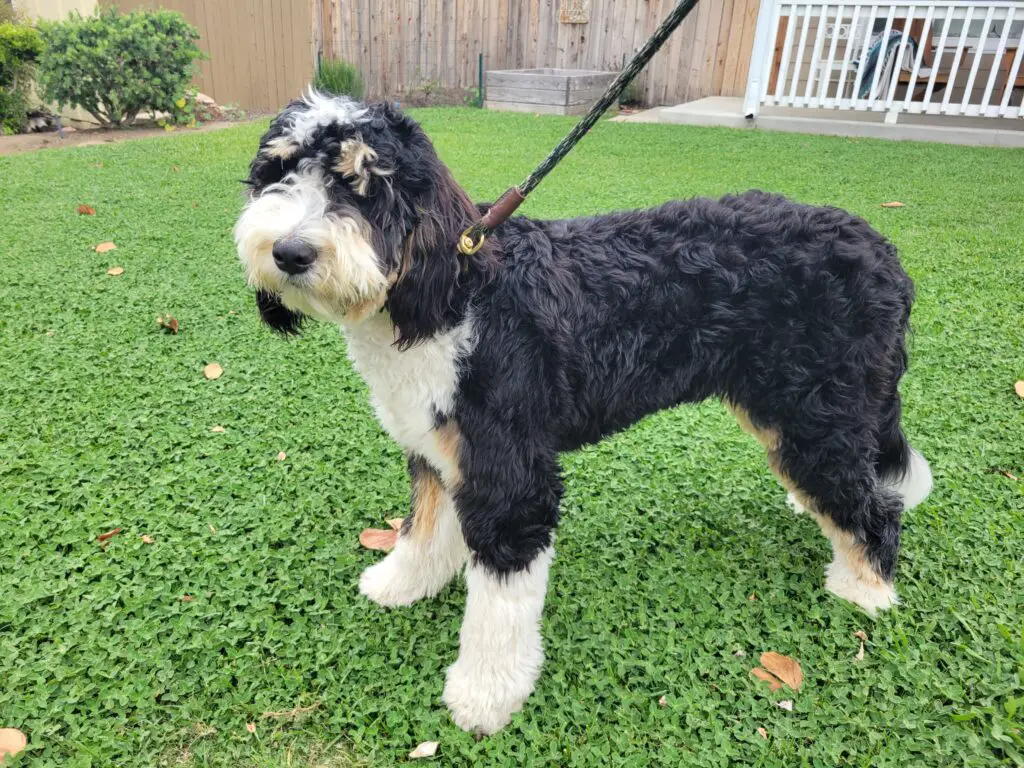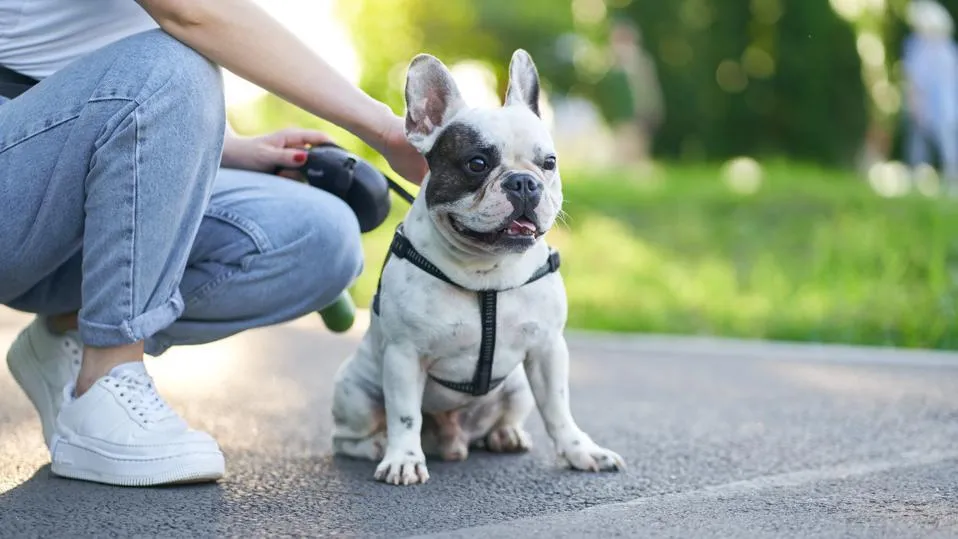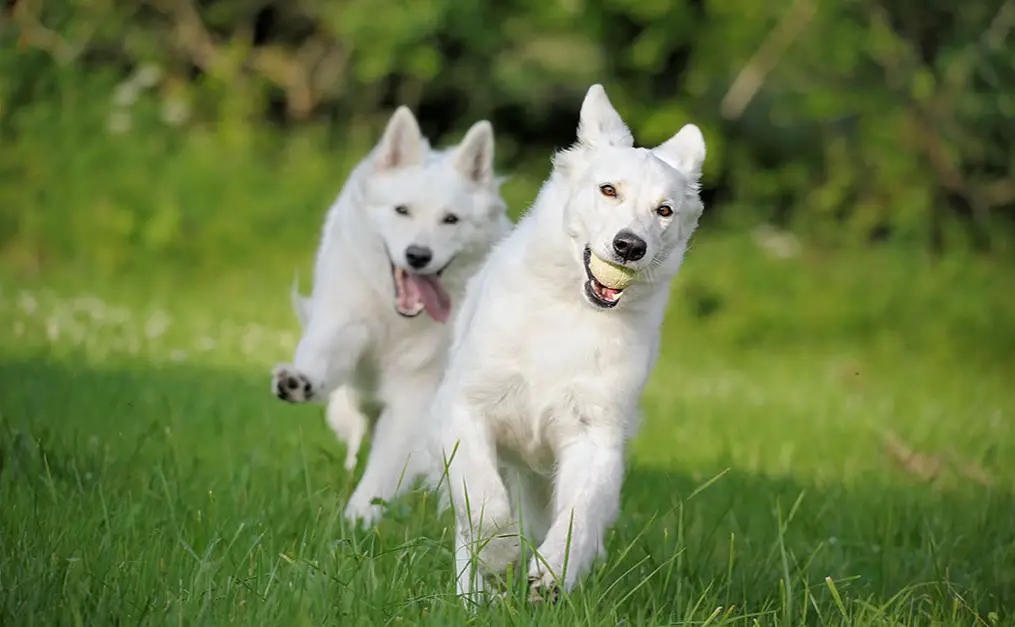Bernedoodles have captured the hearts of dog lovers everywhere with their adorable looks and charming personalities.
As a cross between a Bernese Mountain Dog and a Poodle, these fluffy companions offer a unique blend of traits that make them increasingly popular family pets.
But is a Bernedoodle the right dog for you? Let’s dive into everything you need to know about this delightful hybrid breed.
What Exactly is a Bernedoodle?
A Bernedoodle is a designer dog breed created by crossing a Bernese Mountain Dog with a Poodle.
This intentional mix aims to combine the gentle, friendly nature of the Bernese with the intelligence and low-shedding coat of the Poodle.
The result is an affectionate, smart, and often hypoallergenic pup that comes in a variety of sizes and coat types.
As someone who’s had the pleasure of owning both a Bernese and a Standard Poodle, I can attest to the appeal of combining these two wonderful breeds.
My Bernese, Maple, was the sweetest gentle giant you’d ever meet, while my Poodle, Einstein, could practically do my taxes he was so smart!
A Bernedoodle brings together the best of both worlds.

The Pros of Owning a Bernedoodle
1. Friendly and Affectionate Nature
Bernedoodles are known for their loving and gentle temperament.
They inherit the Bernese Mountain Dog’s fondness for human companionship, making them excellent family dogs.
These pups are typically great with children and other pets, always ready for a cuddle or playtime.
2. Intelligence and Trainability
Thanks to their Poodle parentage, Bernedoodles are highly intelligent and eager to please.
This combination makes them relatively easy to train, especially if you start early.
From basic obedience to complex tricks, these dogs are quick learners.
3. Low-Shedding Coat
One of the biggest draws of the Bernedoodle is their potentially hypoallergenic coat.
While no dog is truly 100% hypoallergenic, many Bernedoodles inherit the Poodle’s low-shedding coat, making them a good choice for allergy sufferers.
However, it’s important to note that coat type can vary, even within the same litter.
4. Size Variety
Bernedoodles come in three main sizes: Standard (50-90 lbs), Mini (25-49 lbs), and Tiny (10-24 lbs).
This variety allows potential owners to choose a size that fits their lifestyle and living situation.
Whether you live in a spacious house or a cozy apartment, there’s likely a Bernedoodle size that’s right for you.
5. Adaptability
These dogs are generally adaptable to various living situations.
While they enjoy outdoor activities, they can also be content in apartments as long as they receive adequate exercise and mental stimulation.
Their easy-going nature makes them suitable for both active families and more laid-back households.

The Cons of Owning a Bernedoodle
1. High Grooming Needs
While their coats may be low-shedding, Bernedoodles require regular grooming to prevent matting and tangling.
Depending on the coat type, they may need daily brushing and professional grooming every 6-8 weeks. This can be time-consuming and costly.
2. Exercise Requirements
Bernedoodles have moderate to high energy levels and need regular exercise to stay happy and healthy.
A bored Bernedoodle can become destructive, so be prepared for daily walks, playtime, and mental stimulation activities.
3. Potential Health Issues
Like many hybrid breeds, Bernedoodles can inherit health problems from both parent breeds.
Common concerns include hip dysplasia, elbow dysplasia, and eye problems.
Regular vet check-ups and a healthy lifestyle are crucial for maintaining their well-being.
4. Separation Anxiety
Bernedoodles form strong bonds with their families and can be prone to separation anxiety if left alone for long periods.
This may not be the ideal breed for households where everyone is away for extended hours each day.
5. Cost
Due to their popularity and the care involved in breeding, Bernedoodles can be quite expensive.
Initial costs can range from $2,000 to $5,000 or more for a puppy from a reputable breeder.
Ongoing costs for food, grooming, and healthcare should also be considered.
Bernedoodle Care Tips
To keep your Bernedoodle happy and healthy, consider these essential care tips:
- Start training and socialization early to ensure a well-behaved adult dog.
- Establish a regular grooming routine to keep their coat healthy and mat-free.
- Provide daily exercise through walks, playtime, and mental stimulation activities.
- Feed a high-quality diet appropriate for their size and energy level.
- Schedule regular vet check-ups to catch and address any health issues early.
Is a Bernedoodle Right for You?
After weighing the pros and cons, you might be wondering if a Bernedoodle is the perfect fit for your family.
Here are some questions to consider:
- Do you have the time and patience for regular grooming?
- Can you provide daily exercise and mental stimulation?
- Are you prepared for the potential costs associated with owning a Bernedoodle?
- Does your lifestyle allow for plenty of quality time with your dog?
If you answered yes to these questions and are looking for a loving, intelligent, and potentially hypoallergenic companion, a Bernedoodle might just be your perfect match.
Remember, every dog is an individual, and while breed characteristics can give you a general idea of what to expect, your Bernedoodle’s personality will be uniquely their own.
With proper care, training, and lots of love, a Bernedoodle can be a wonderful addition to your family, bringing joy and companionship for years to come.  woman holding a bernedoodle puppy 2
woman holding a bernedoodle puppy 2
Adorable Bernedoodle lounging on sofa Whether you’re drawn to their teddy bear looks or their loving nature, Bernedoodles have a lot to offer.
Just be prepared for plenty of cuddles, outdoor adventures, and a loyal friend who’ll always be by your side.
After all, isn’t that what we all want in a furry companion?
Breed information
| Characteristic | Information |
|---|---|
| Name | Bernedoodle |
| Origin | United States |
| Group | Companion/Hybrid |
| Size | Varies (Standard, Miniature, and Tiny) |
| Height (Standard) | 23-29 inches (58-74 cm) |
| Height (Miniature) | 18-22 inches (46-56 cm) |
| Height (Tiny) | 12-17 inches (30-43 cm) |
| Weight (Standard) | 50-90 lbs (23-41 kg) |
| Weight (Miniature) | 25-50 lbs (11-23 kg) |
| Weight (Tiny) | 10-25 lbs (4.5-11 kg) |
| Lifespan | 12-15 years |
| Coat | Wavy or curly; can be fleece or wool-like |
| Color | Various colors including black, white, brown, and combinations like tri-color or bi-color |
| Temperament | Friendly, intelligent, affectionate, social |
| Energy Level | Moderate to high |
| Exercise Needs | Moderate; daily walks, playtime, and mental stimulation required |
| Intelligence | High; quick learner and enjoys training |
| Trainability | High; responds well to positive reinforcement and consistent training |
| Grooming Needs | Moderate to high; regular brushing and occasional grooming needed to maintain coat |
| Shedding | Low to moderate |
| Health Issues | Hip dysplasia, elbow dysplasia, certain eye conditions (e.g., cataracts), potential for allergies |
| Diet | High-quality dog food; typically 2-4 cups per day depending on activity level and size |
| Good with Children | Generally good; friendly and patient with children |
| Good with Other Pets | Generally good with other pets if properly socialized |
| Barking | Moderate; may bark at strangers or unusual noises |
| Adaptability | Adaptable to various living situations; enjoys companionship and regular exercise |
| Trainability | High; thrives on learning and positive reinforcement |
| AKC Classification | Not yet recognized by the American Kennel Club (AKC) but often listed as a hybrid breed |
Sources:
- Bernedoodle Club of America – Bernedoodle Information
- Doodle Guide – Bernedoodle Overview
- Vetstreet – Bernedoodle Overview


















